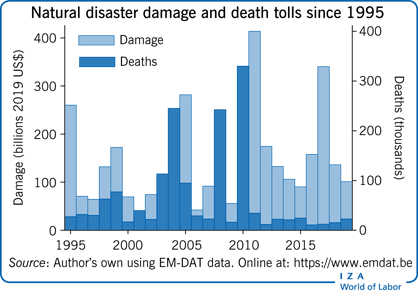Elevator pitch
Extreme weather events are increasing in frequency and intensity, threatening lives and livelihoods around the world. Understanding the short- and long-term effects of such events is necessary for crafting optimal policy. The short-term economic impacts of natural disasters can be severe, suggesting that policies that better insure against consumption losses during this time would be beneficial. Longer-term economic impacts are more complex and depend on the characteristics of the affected population and the affected area, changes in migration patterns, and public policy.

Key findings
Pros
Out-migration following a natural disaster can serve as an important coping mechanism and reduce the number of individuals who are vulnerable to future disasters.
Labor market outcomes appear to be resilient to natural disasters in the long term, at least in wealthy countries.
Although the welfare effects of extreme weather events are surely negative, natural disasters can sometimes improve victims’ outcomes along some dimensions.
Cons
The short-term effects of natural disasters can be severe, even in wealthy countries.
Large natural disasters reduce victims’ income and consumption in the short term.
Researchers lack causal estimates of the effects of natural disaster aid.
More research is needed to understand the long-term effects of natural disasters on individuals, which could differ from their long-term effects on affected areas due to post-disaster migration.